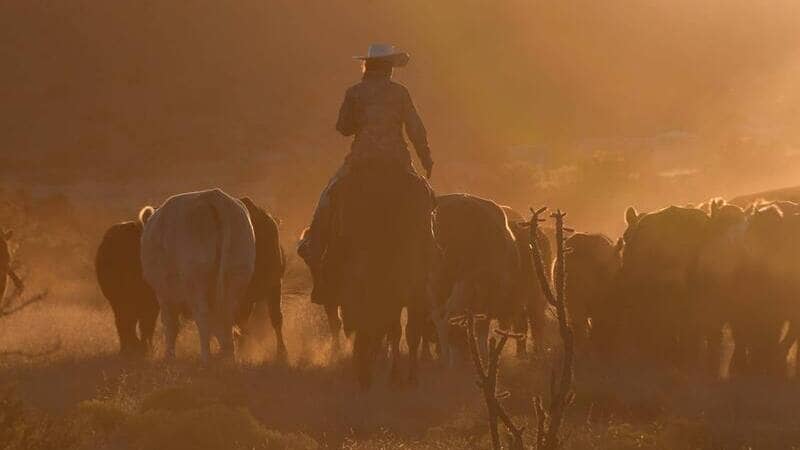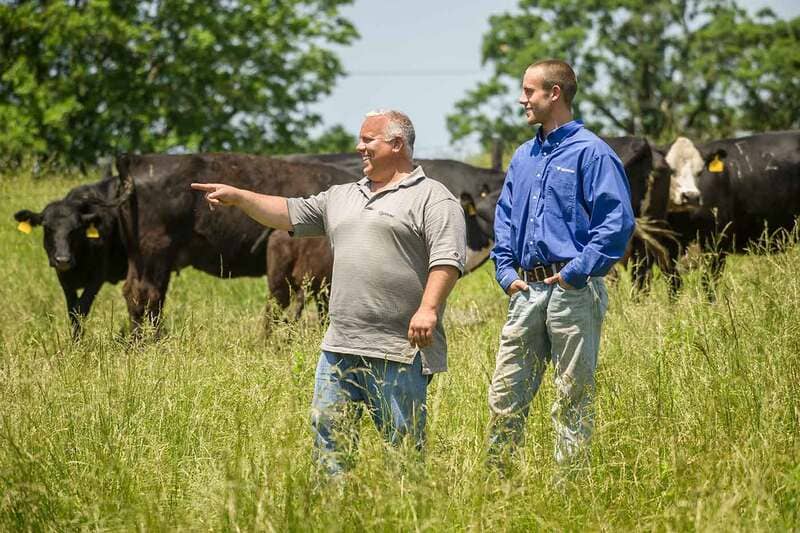Great plans for the Great Plains
Cargill, Burger King and National Fish and Wildlife Foundation support ranchers addressing climate change in Southern Great Plains
Read Time: 3 minutes
April 28, 2022
- Cargill is partnering with Burger King and the National Fish and Wildlife Foundation to support cattle ranchers committed to addressing climate change in the U.S. Southern Great Plains.
- The initiative supports Cargill’s BeefUp Sustainability effort — which seeks to reduce greenhouse gas emissions throughout the company’s North American beef supply chain by 30% by 2030.
- “These are win-win management strategies that we are proud to work with agency and conservation partners on,” says one of the partner ranchers.
If the U.S. Southern Great Plains is a stage, a unique set of animals are the actors that grace it.
From Monarch butterflies to songbirds, many of the species migrate to and from the region throughout their life cycle. Others — from the pronghorn to the swift fox, the prairie chicken to the bobwhite quail — are year-round residents.
Also center stage are livestock, primarily beef cattle, carefully raised by ranchers like Bret Riley of New Mexico. Bret knows the value of sharing and taking care of the stage, ensuring everyone plays their part and the show goes on.
That’s why cattle ranchers like him are at the heart of a new partnership with Cargill, Burger King and the National Fish and Wildlife Foundation (NFWF) — the largest U.S. private conservation grant provider. The partnership supports cattle ranches committed to addressing climate change through regenerative agriculture practices in Colorado, Kansas, Nebraska, New Mexico, Oklahoma and Texas.
“ “Building good prairie chicken habitat builds good cow habitat. These are win-win management strategies that we are proud to work with agency and conservation partners on.”
Cargill, Burger King and NFWF will bring financial and technical resources to ranching and conservation organizations to improve grassland management and reduce greenhouse gas emissions. A $5 million investment, plus up to an additional $5 million more in grantee match funding, will go toward a goal to benefit 1 million acres.
The partnership reinforces the important role beef and cattle play in helping the Great Plains thrive.

Photo credit: National Fish and Wildlife Foundation
“This new public-private partnership creates an exciting opportunity to support impactful conservation projects throughout the Southern Great Plains,” says Jeff Trandahl, executive director and CEO of NFWF. “Given the importance of these ecosystems to the preservation of wildlife, the prosperity of rural communities and to the stability of our climate, it’s essential that we work hand-in-hand with the ranching community to keep grasslands healthy and productive.”
The Southern Great Plains initiative is one of eight partnership programs Cargill is spearheading to support BeefUp Sustainability — which seeks to reduce greenhouse gas emissions throughout the company’s North American beef supply chain by 30% by 2030. This collaboration builds on existing partnerships with both Burger King and NFWF.
"It will take a multi-pronged approach to protect, regenerate and restore lands to mitigate climate impact,” says Heather Tansey, Cargill’s vice president of environmental sustainability. “As part of Cargill’s largest and most ambitious program on climate change, BeefUp Sustainability, we recognize that our farmers and ranchers across North America are already leading environmental stewardship practices and just need further incentives, tools and training to help scale these impactful practices.”

Best practices, big impact
Through funding from Cargill and Burger King, matched by NFWF, three grants were recently awarded for projects in Kansas, New Mexico and Texas. Those grants will support ranchers’ voluntary grassland management practices that consider the unique needs of their land.
“As one of the biggest buyers of beef in North America, partnering with Cargill and NFWF allows us to accelerate ambitious efforts to reduce greenhouse gas emissions in our beef supply chain and to make meaningful impacts important to our planet and Guests,” says Tom Curtis, president of Burger King. “Put simply — it’s the right thing for us to do. Beef can be a force for good, particularly when it comes to improved rangeland management as a mechanism for directly addressing climate change. We’re committed to creating a more resilient food system and collaborating as a team to advance noticeable change.”
The projected impact of this new five-year initiative? The potential to sequester up to 360,000 metric tons of carbon dioxide equivalent per year — the equivalent of removing 904 million miles of driving or of powering 43,000 U.S. homes for one year.
"This project highlights the key role that ranchers and grazing animals play in maintaining grassland ecosystems, feeding our nation and sustaining the economic vitality of rural communities,” says Lesli Allison, executive director of Western Landowners Alliance, a partner organization enhancing grassland habitat through data-informed adaptive grazing management and restoration in New Mexico.
More stories
Grass, greenhouse gas and grazing: Why North America’s prairies are key to cutting emissions
In North America, prairie grass used to be everywhere. Today, just a fraction of it remains.
Read Time: 4 minutes
